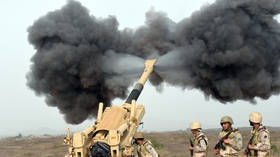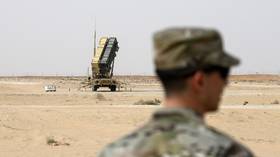Biden promised to stop the Saudi war machine. He hasn't
The war on Yemen is worse than ever, but the US mainstream media stays silent as the atrocities continue.
Shortly after he took office, US President Joe Biden announced the end of his country’s support for Saudi Arabia’s offensive war efforts in beleaguered Yemen, vowing to make diplomatic efforts to end the conflict a top priority.
Yet, despite these promises, which saw Biden showered with praise, his support for Riyadh has not budged. Ten months on from his pledge, Saudi warplanes continue to shower bombs on impoverished Yemenis, whose country is one of the Arab world’s poorest nations. Ground fighting around the northern Yemeni city of Marib has, in particular, sparked a humanitarian catastrophe.
In the US media, there has been a near-blackout on the war in Yemen since the Saudi-led coalition began its lethal bombing campaigns in 2015. The UN predicts that the death toll will reach 377,000 by the end of this year. In the past two months alone, fighting in the oil-rich Marib region has led to the deaths of thousands, as well as the displacement of around 42,000 civilians.
Some focus was placed on the issue in the media during Donald Trump’s presidency, primarily due to the passing of a bipartisan piece of legislation in 2019 aimed at ending American financial support for the war. Trump vetoed the legislation in an effort to continue Washington’s backing of the coalition forces, drawing criticism from across the political spectrum, but since Biden took office, any interest the corporate media had in covering the war has dropped significantly.
Yemen has been wracked by civil wars for decades, but the current conflict broke out in March 2015, when the Saudi-led coalition military intervened on behalf of the internationally recognised government against Houthi rebels aligned with a former president, Ali Abdullah Saleh.
Riyadh expected its air power – mostly British planes dropping British-made bombs, flown by British-trained pilots and maintained in the kingdom by thousands of British contractors – to win the war in five weeks.
Instead, six years on, it’s estimated that 80% of the population of 24 million people who are still alive need food and assistance, with many merely a “step away from starvation.”
The latest fighting flared up in late February, when Ansar Allah (‘Supporters of God’), otherwise known as the Houthi rebels, launched an offensive to capture the resource-rich Marib region, the last northern stronghold of the Saudi-backed forces of President Abdrabbuh Mansur Hadi.
The offensive was seen as the best strategic option for Ansar Allah – accused of being backed by Iran – to extract greater terms from Hadi’s forces, after peace talks deteriorated. With the Saudi-backed forces – who have been accused of working with IS (Islamic State, formerly ISIS) and al-Qaeda – losing significant portions of the Marib governorate, the Saudi-led air force has lashed out, bombarding the country’s capital, Sana’a, and elsewhere.
It’s impossible to tell the exact death toll resulting from airstrikes by Saudi Arabia and its allies, which include more than 300 direct strikes by the US. However, the United Nations (UN) has declared that, by deliberately targeting civilians, war crimes have been committed by the Saudis. When the UN Human Rights Council decided earlier this year to investigate the extent to which the Saudi-led coalition was responsible for the world’s number-one humanitarian crisis, Riyadh used bullying,“incentives, and threats” to close down the inquiry and shield it from accountability.
The “humanitarians” of the Biden administration, which promised to end support for Saudi Arabia’s “offensive actions,” sealed a $500-million weapons deal with Riyadh in October. And US forces still provide logistical support for the Saudi-led coalition, just as US contractors continue to service the jets used to bomb Yemen – all moves condemned by the likes of progressive Senator Bernie Sanders (D-VT).
Indeed, along with Congressman Ro Khanna (D-CA), Sanders took out a joint op-ed in The Guardian earlier this month, urging the Biden administration to start “utilizing its leverage to pressure Saudi Arabia to lift the blockade on Yemen, which continues to block fuel and other essential imports into the country, pushing millions of Yemenis toward the brink of starvation.” It added: “Lifting the blockade must happen immediately and be delinked from final peace negotiation talks.” These demands fly in the face of formally US positions, which have sought to tie the lifting of the blockade to a political solution.
As cruise missiles are fired into Saudi territory and the Saudi-dled coalition’s warplanes carpet-bomb Yemen’s capital with Western-made munitions, what has to be kept in mind are the broken promises of the American president. Millions of Yemenis are near death, many more have been displaced in the fighting, yet, in the United States, not even this dire state of affairs is giving the government the urgency to pursue a rational foreign-policy approach that isn’t informed by political bias and business interests.
It’s almost inevitable that Marib will fall to Ansar Allah, so why don’t they delay the inevitable and use their clout to pressure Saudi Arabia into adopting a less aggressive approach that would protect the civilians who are being caught in the crosshairs of the ongoing battle? This question, like others involving the Biden administration’s foreign policy, can be answered in the same way: the US doggedly refuses to accept that, sometimes, things will not go its way and it cannot just blow everything up to avoid making concessions.
Biden has form for making false promises on Saudi. He said on the campaign trail in 2020 he would punish Saudi Arabia’s Crown Prince Mohammed bin Salman for his role in the killing of journalist Jamal Khashoggi, but, once in office, refused to act.
The recent Saudi campaign against Lebanon, which cost the latter’s economy millions, has also passed without any US intervention. A country already suffering an economic crisis, with nearly 80% of its people living below the poverty line, Lebanon was coerced by Saudi Arabia and its alliance of Persian Gulf States to accept the forced resignation of Minister George Kordahi for comments he made condemning Saudi’s war efforts in Yemen prior to being appointed to a role in government. As long as the US refuses to punish or pressure its allies, its arguments against other foreign powers for their alleged human-rights abuses will forever continue to lack weight.
So, was it all a lie that Biden wanted to end the conflict in Yemen? If so, why don’t we hear anything about it on CNN or MSNBC? The current US administration is proving itself to be just as bad as the previous two, when it comes to the war on Yemen. For some Americans, the gentler, less uncouth language emanating from the White House these days may make them feel better about who runs their country, but for Yemenis, it’s doubtful that much value is attached to the hollow, politically correct words of those aiding in the supply of the bombs and planes that kill their children.
The statements, views and opinions expressed in this column are solely those of the author and do not necessarily represent those of RT.


















